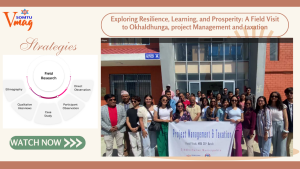From Automation to Autonomy: How AI is Changing the Game

by Er.Saurya Paudel, MBA-IT 7th Batch

The idea of removing human intervention has been a game changer for many industries. These industries have been able to manufacture their products faster while reducing the error that came with human intervention. Likewise, the service sector is not an exception to the changing scene with the utilization of Artificial Intelligence.
As businesses have started to incorporate technology into their ecosystem, they have been leveraging the benefits of the technology in a number of ways. The benefits include improved communication, enhanced efficiency, expanded reach, innovation, and many more. This realization has helped envision new opportunities for new and existing businesses in terms of incorporating technology on a bigger scale.
With the increasing adoption of technology, there still remains some human intervention leading to errors. As an example, Automation still has not been completely free of human involvement. Processes like design and implementation, maintenance and upgrades, and exception handling require higher involvement of humans. Due to this dependency and to reduce human intervention companies have been hugely focusing on transitioning their processes from automation to autonomy. This shift is being driven by advancements like reinforcement learning, deep learning, and natural language processing in AI technology that allows machines to not just perform tasks, but to learn from their experiences and make decisions on their own.
The implementation of automation made it possible for the mass production and delivery of goods and services at a much faster pace and with higher efficiency. Industries like manufacturing, automotive, real estate and e-commerce, and hospitality have been the leading adopters of using this technology and they have brought more stability, accuracy, and quality to their products and services. Automation despite being preferred by industries has another limitation i.e. they can only perform the tasks that they are programmed with. They lack the ability to adapt to changing circumstances or make decisions beyond their programming. In situations where the system needs to make decisions on its own, automation will not be able to perform well leading to disruption in the business.
That’s where autonomy comes in. Autonomous systems are able to learn from their environment and experiences, making decisions and taking actions based on what they have learned. These systems are not just following pre-set rules; they are actively learning and improving on their own.
Some of the areas where Autonomy is being used are:
- Self-driving cars – Self-driving vehicles use a combination of sensors, GPS, and AI to navigate the roadways. They can detect other vehicles, pedestrians, and even road signs, and make decisions on how to navigate around them. Self-driving cars are not just automating the task of driving, they are becoming autonomous drivers that can adapt to changing traffic conditions and make decisions on their own.
- Customer service – AI-powered chatbots are becoming increasingly popular as a way to provide 24/7 customer support. These chatbots are not just programmed to respond to certain questions, they are able to learn from their interactions with customers and improve their responses over time. This means the customers can receive more personalized and efficient support without having to wait for a human representative.
- Robotics and Manufacturing – Autonomous robots are employed in manufacturing as well as hospitality sectors. These robots can operate independently depending upon the changes in the environment.
- Agriculture – Autonomous systems are used in agriculture for determining the health of crops, the need for fertilizers, and other similar purpose. Robots equipped with sensors are used to monitor and perform certain operations which help in improving productivity and reducing labor requirements.
As the list of use of autonomous systems grows, the shift toward autonomy is not without its challenges. Autonomous systems have resulted in job displacement which is one of the biggest concerns. As machines become more autonomous, there is a fear that they will replace human workers. While this is a valid concern, it is important to remember that automation has already displaced many jobs, and the shift toward autonomy is just another step in that direction.
However, autonomy also presents new opportunities for job creation. As machines become more autonomous, there will be a need for people to design, program, and maintain them. This means there will be a growing demand for workers with the skills and knowledge to work with autonomous systems.
In conclusion, the shift towards autonomy has been much anticipated as the development in the field of AI. Till now it has been a game changer by allowing machines to learn from their environment as well as experiences, and be able to make decisions on their own. Autonomous systems will help to achieve higher efficiency and productivity while it decreases the risk of safety by decreasing the potential for human error. As the system will result in job displacement, it will also help to create more job opportunities that do not require human labor but need creativity and innovation. Similarly, the implementation of an autonomous system will help in the collection of data and perform various analyses to make data-driven decisions. These implementations however can raise questions on ethical considerations and formulation of strict legal framework. The challenges also lie in the adoption and acceptance of these systems with respect to society. These implications can vary according to the context, industry, and level of autonomy used. As we continue to develop more advanced AI technology, we will undoubtedly see even more applications of autonomy in the future.






👏👏👏👏
The article presents a well-portrayed scenario on how AI is making its presence felt and how one should adapt to changes that come along with this. As students and professionals, I think that it’s highly necessary to integrate our learnings and develop skills to cope with change.
Great article Shaurya, hoping to read more from you in the coming days.